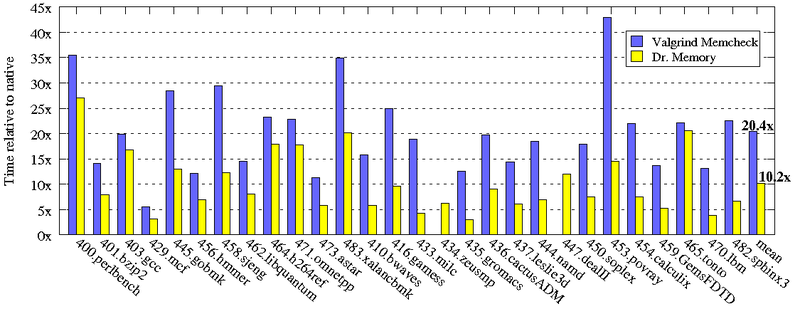|
Dr. Memory
|
Dr. Memory is a memory monitoring tool capable of identifying memory-related programming errors such as accesses of uninitialized memory, accesses to unaddressable memory (including outside of allocated heap units and heap underflow and overflow), accesses to freed memory, double frees, memory leaks, and (on Windows) handle leaks, GDI API usage errors, and accesses to un-reserved thread local storage slots.
Dr. Memory operates on unmodified application binaries running on Windows, Mac, Linux, or Android on commodity IA-32, AMD64, and ARM hardware.
Dr. Memory is built on the DynamoRIO dynamic instrumentation tool platform.
Downloading Dr. Memory
Dr. Memory is released under an LGPL license. Windows, Linux, and Mac packages are available for download. The sources are also browsable.
Dr. Memory Performance
Dr. Memory is faster than comparable tools, including Valgrind, as shown in our CGO 2011 paper Practical Memory Checking with Dr. Memory, where we compare the two tools on Linux on the SPECCPU 2006 benchmark suite:

(Valgrind is unable to run 434.zeusmp and 447.dealII).
Documentation
Documentation is included in the release package as well as on this site: start with Installing Dr. Memory and Preparing Your Application.
System Call Tracer for Windows
The Dr. Memory release includes a System Call Tracer for Windows.
Fuzz Testing Infrastructure
Dr. Memory includes Dr. Fuzz, a Fuzz Testing Mode, along with a configurable Dr. Fuzz: Dynamic Fuzz Testing Extension. Dr. Fuzz targets in-process function-level fuzzing, repeatedly running a target function while varying the inputs. It requires no access to source code, and supports code coverage-guided fuzzing, an input corpus, input dictionaries, and custom mutators.
Discussion List
Dr. Memory has its own discussion list.
Issue Tracker
Dr. Memory has its own Issue Tracker.
Contributing to Dr. Memory
We welcome contributions to Dr. Memory. We use the same code review and workflow as for DynamoRIO.
